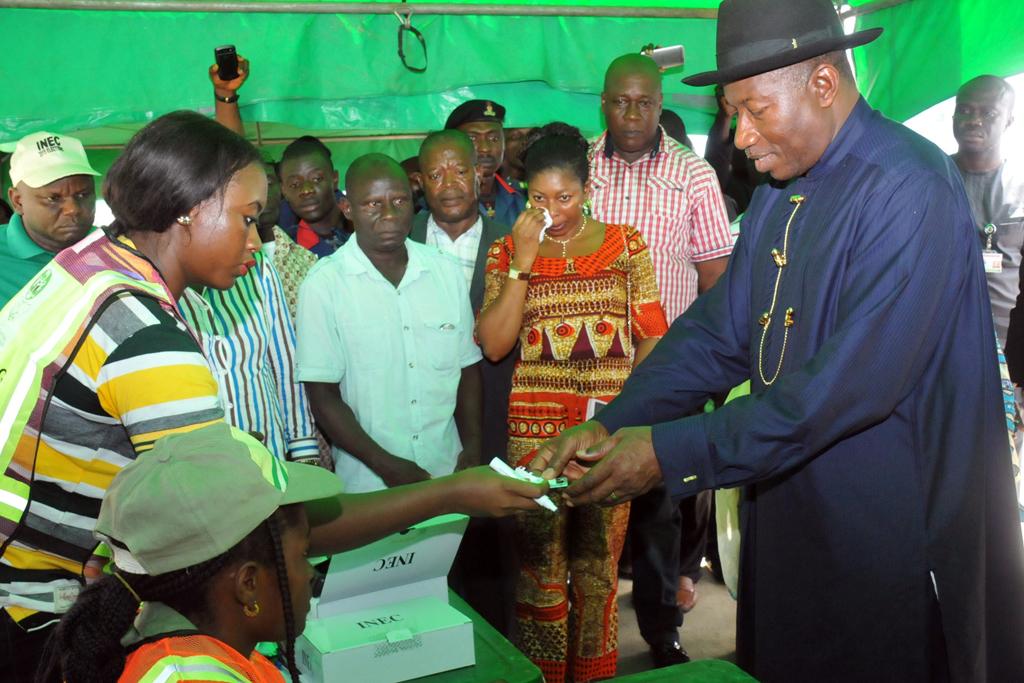Nigerians vote in first genuine contest since end of dictatorship
Nigerian President Goodluck Jonathan is registered to vote on March 28, 2015 in Otuoke.
ABUJA, Nigeria — Nigerians went to the polls on Saturday for the first genuine electoral contest since the end of military rule in 1999, in which an opposition candidate has a fighting chance of unseating the incumbent President Goodluck Jonathan.
The tense race pits Jonathan against former military ruler Muhammadu Buhari with an electorate divided along a complex mix of ethnic, regional and in some cases religious lines.
Twelve other minor candidates are also running.
Polls were meant to open for accreditation at 120,000 ballot stations at 8 a.m. (0300 GMT), with actual voting starting at 1.30 p.m. and continuing until the last person has voted. With 56.7 million eligible voters, it could drag well into Sunday.
Problems emerged as scanners failed to recognize some cards and fingerprints across the country, including that of Jonathan, who waited more than 40 minutes as officials vainly tried to get four different machines to work.
"My own (card) and that of my wife, we have some problems but they are sorting that out," he told reporters.
Biometric card readers were introduced to prevent the rampant ballot box stuffing and multiple voting of past polls.
A credible and peaceful poll would open a new chapter in the history of Africa's most populous nation, biggest economy and top oil producer, whose five decades of independence have been tarnished by graft, military coups and secessionist movements.
Registration began on time in some polling stations in the northern cities of Kaduna and Kano, both of which erupted in violence in the 2011 poll, but elsewhere voters had to wait.
"They were supposed to be here before we arrived," said Linus Okorie, one of 60 impatient voters at a poll in Abuja.
Many will spend most of their Saturday waiting to vote.
"They are extraordinarily patient," U.S. Assistant Secretary of State for African Affairs Linda Thomas-Greenfield told Reuters TV at a polling station in central Abuja, "waiting in line even when the voters' machine is not ready. We have to commend the Nigerian people for being so patient."
Post-election danger
The vote is seen as a referendum on the record of Jonathan, a former zoology professor whose time in office has been blighted by massive corruption scandals and an insurgency by Islamist Boko Haram militants in which thousands have died.
"These elections are a defining moment for Nigeria. There is stiff competition. People have a real choice about who they want as leader," former Malawian President Bakili Muluzi, who is leading a Commonwealth observer mission, told Reuters.
"The danger is post-election. We've been assured by the peace accord between the leaders but how that trickles down is the danger," he said, referring to a second pact signed between Jonathan and Buhari on Friday not to whip up violence.
Yet the poisonous rhetoric emanating from both sides during the campaign, as well as some scuffles and shootings, have raised doubts over whether such agreements will be respected.
When Buhari, a northern Muslim, lost to Jonathan, a southern Christian, in 2011, it triggered rioting in the mostly Muslim north that killed 800 people and destroying the homes of 65,000.
Before voting started, bomb blasts struck two polling stations in eastern Nigeria, causing no deaths. Police said they destroyed a third bomb in a controlled explosion in Osisioma Aba, in Abia state, also in the east.
Hackers also shut the electoral commission website.
"Devilish moves"
On Friday Jonathan told anyone planning violence to think again, yet many Nigerians queued up en masse on Friday to withdraw cash, buy fuel supplies and stock up on provisions at supermarkets.
In a climate of mutual suspicion, Buhari's All Progressives Congress warned against "devilish moves by those … bent on rigging the elections and plunging the nation into crisis."
Buhari's top selling point is a belief he never stole during his 1983-85 rule, a rare feat for a top Nigerian politician.
His reputation as an experienced army leader also plays well with voters critical of the government's failure to protect civilians from Boko Haram.
Buhari's authoritarian rule, in which opponents were jailed and drug dealers executed, is not fondly remembered by all.
And as always in the nation of 170 million people, ethnic and regional sentiments remain paramount. Buhari is hugely popular in the north, Jonathan, in the south and east.
That could leave the mostly ethnic Yoruba but religiously mixed southwest, centered around the commercial capital Lagos, the kingmakers. They voted for Jonathan last time but since then Yoruba elite have rallied decisively around Buhari.
(By Tim Cocks and Bate Felix. Additional reporting by Angela Azumadu in Abuja, Julia Payne in Port Harcourt and Alexis Akwagiram in Kaduna, Felix Onuah in Abuja, Nnekule Ikemfuna in Kano, Chijioke Ohuocha and Oludare Mayowa in Lagos; Editing by Ed Cropley and Raissa Kasolowsky)
We want to hear your feedback so we can keep improving our website, theworld.org. Please fill out this quick survey and let us know your thoughts (your answers will be anonymous). Thanks for your time!
